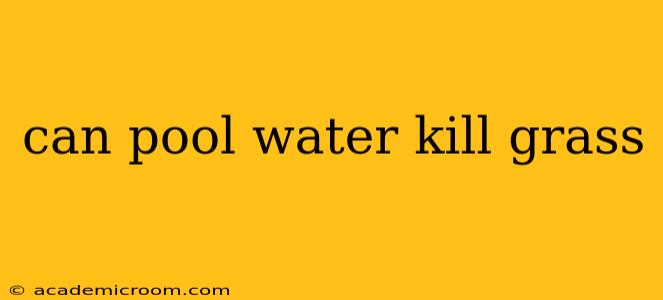Pool water, while refreshing for swimmers, can be detrimental to your lawn if not handled properly. The chemicals used to keep your pool clean and sparkling, primarily chlorine, are the main culprits. But the impact isn't always immediate or uniform; several factors influence whether or not pool water will kill your grass. This comprehensive guide explores the effects of pool water on grass, addressing common concerns and offering solutions.
What's in Pool Water That Harms Grass?
The primary concern is chlorine. While essential for sanitizing pool water, high concentrations of chlorine are toxic to plants. Chlorine disrupts photosynthesis, the process plants use to convert sunlight into energy, leading to chlorosis (yellowing) and eventually death. Other chemicals commonly found in pool water, such as algaecides and other sanitizers, can also contribute to grass damage. The concentration of these chemicals, along with the duration of exposure, determines the severity of the damage.
How Does Pool Water Kill Grass?
Pool water doesn't instantly kill grass. The damage is gradual and depends on several factors:
- Concentration of Chemicals: Higher concentrations of chlorine and other chemicals lead to quicker and more severe damage.
- Duration of Exposure: Prolonged exposure to even low concentrations of pool water can ultimately harm your grass.
- Type of Grass: Different grass species have varying tolerances to chlorine and other chemicals. Some are more resilient than others.
- Soil Type: Well-drained soil can mitigate some of the damage by diluting the concentration of chemicals, while poorly drained soil can exacerbate the problem.
- Watering Frequency: Frequent watering after pool water exposure can help dilute the chemicals and reduce damage.
How Much Pool Water Will Kill Grass?
There's no single answer to this question. A small spill of pool water is unlikely to cause significant damage, especially if diluted by rain or watering. However, large volumes of pool water, especially if concentrated in one area, can severely damage or kill grass. The key factor isn't the volume alone, but the concentration of chemicals and the duration of exposure.
Can Pool Water Damage Affect My Lawn Long-Term?
Repeated exposure to pool water can lead to long-term damage, even if individual incidents appear minor. The cumulative effect of chemical exposure can weaken the grass, making it more susceptible to diseases, pests, and other stressors. This can result in patchy, unhealthy lawns requiring significant time and effort to recover.
What to Do If Pool Water Spills on Your Lawn
If pool water spills onto your lawn, take immediate action:
- Flush the area with plenty of fresh water. This helps dilute the chemicals and reduce their impact.
- Monitor the affected area closely. Watch for signs of chlorosis (yellowing) or browning.
- Consider applying a lawn fertilizer. This can help the grass recover faster.
- Aerate the soil if necessary. Improving soil drainage can help mitigate the damage.
Can I Use Pool Water to Water My Lawn?
No, absolutely not. Using pool water to water your lawn is a very bad idea and will almost certainly damage or kill your grass. The high concentration of chlorine and other chemicals is far too strong for plants to tolerate.
How Can I Prevent Pool Water From Damaging My Lawn?
- Regular maintenance of your pool: Keep your pool properly balanced to minimize the concentration of harsh chemicals.
- Careful handling of pool water: Avoid spills and overflows whenever possible.
- Proper drainage around the pool: Ensure good drainage to prevent pooling and runoff.
- Regular lawn care: A healthy lawn is more resilient to stress.
By understanding the potential hazards of pool water and taking proactive steps, you can protect your lawn and maintain its lush, healthy appearance. Remember, prevention is always better than cure.
